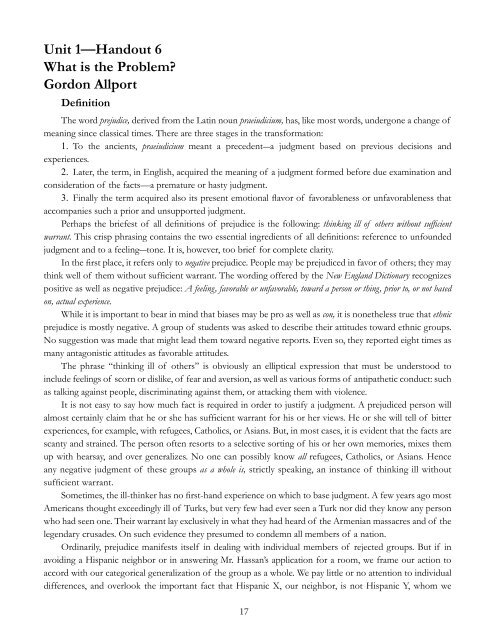Download - Canada ALPHA
Download - Canada ALPHA
Download - Canada ALPHA
Create successful ePaper yourself
Turn your PDF publications into a flip-book with our unique Google optimized e-Paper software.
Unit 1—Handout 6<br />
What is the Problem?<br />
Gordon Allport<br />
Defi nition<br />
The word prejudice, derived from the Latin noun praeiudicium, has, like most words, undergone a change of<br />
meaning since classical times. There are three stages in the transformation:<br />
1. To the ancients, praeiudicium meant a precedent―a judgment based on previous decisions and<br />
experiences.<br />
2. Later, the term, in English, acquired the meaning of a judgment formed before due examination and<br />
consideration of the facts—a premature or hasty judgment.<br />
3. Finally the term acquired also its present emotional fl avor of favorableness or unfavorableness that<br />
accompanies such a prior and unsupported judgment.<br />
Perhaps the briefest of all defi nitions of prejudice is the following: thinking ill of others without suffi cient<br />
warrant. This crisp phrasing contains the two essential ingredients of all defi nitions: reference to unfounded<br />
judgment and to a feeling―tone. It is, however, too brief for complete clarity.<br />
In the fi rst place, it refers only to negative prejudice. People may be prejudiced in favor of others; they may<br />
think well of them without suffi cient warrant. The wording offered by the New England Dictionary recognizes<br />
positive as well as negative prejudice: A feeling, favorable or unfavorable, toward a person or thing, prior to, or not based<br />
on, actual experience.<br />
While it is important to bear in mind that biases may be pro as well as con, it is nonetheless true that ethnic<br />
prejudice is mostly negative. A group of students was asked to describe their attitudes toward ethnic groups.<br />
No suggestion was made that might lead them toward negative reports. Even so, they reported eight times as<br />
many antagonistic attitudes as favorable attitudes.<br />
The phrase “thinking ill of others” is obviously an elliptical expression that must be understood to<br />
include feelings of scorn or dislike, of fear and aversion, as well as various forms of antipathetic conduct: such<br />
as talking against people, discriminating against them, or attacking them with violence.<br />
It is not easy to say how much fact is required in order to justify a judgment. A prejudiced person will<br />
almost certainly claim that he or she has suffi cient warrant for his or her views. He or she will tell of bitter<br />
experiences, for example, with refugees, Catholics, or Asians. But, in most cases, it is evident that the facts are<br />
scanty and strained. The person often resorts to a selective sorting of his or her own memories, mixes them<br />
up with hearsay, and over generalizes. No one can possibly know all refugees, Catholics, or Asians. Hence<br />
any negative judgment of these groups as a whole is, strictly speaking, an instance of thinking ill without<br />
suffi cient warrant.<br />
Sometimes, the ill-thinker has no fi rst-hand experience on which to base judgment. A few years ago most<br />
Americans thought exceedingly ill of Turks, but very few had ever seen a Turk nor did they know any person<br />
who had seen one. Their warrant lay exclusively in what they had heard of the Armenian massacres and of the<br />
legendary crusades. On such evidence they presumed to condemn all members of a nation.<br />
Ordinarily, prejudice manifests itself in dealing with individual members of rejected groups. But if in<br />
avoiding a Hispanic neighbor or in answering Mr. Hassan’s application for a room, we frame our action to<br />
accord with our categorical generalization of the group as a whole. We pay little or no attention to individual<br />
differences, and overlook the important fact that Hispanic X, our neighbor, is not Hispanic Y, whom we<br />
17


